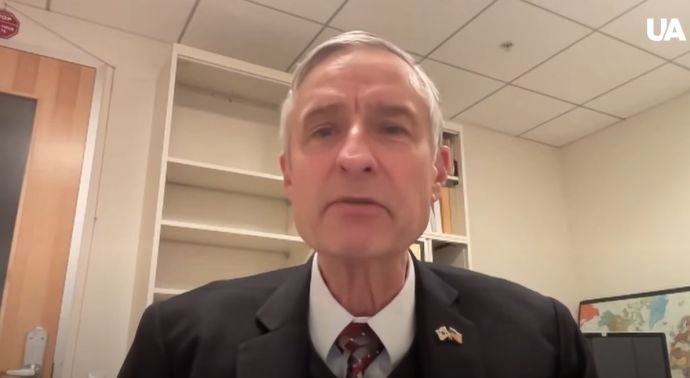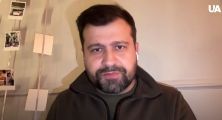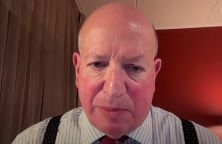In South Korea, a Ministry of Unification exists – does it mean that South Korea has not abandoned hope for unification? The North is so confident in its military power that is “preparing for a holy war” with the South – what are the chances of sides?
Dr. Bruce Bennett, Senior Defence Analyst in RAND Corporation expert on Korea answers our questions.
— Is North Korea really as closed to the rest of the world as we think? Because it seems like it does some trade and some political contacts are held. Or am I wrong?
— Oh, it does trade, primarily with China. Ninety percent of its trade in the last five or so years has been with China. So, it’s pretty closed. With COVID, it closed down even more, and now it’s opening up a little bit. But it appears that Kim Jong-un has concluded that the most dangerous thing to him is outside information.
His people are starting to realize that the regime is telling a lot of lies.
As outside information percolates in, he’s in jeopardy. I mean, Kim has even said K-pop is a “vicious cancer” that is corrupting the morals of his younger generation and could cause his regime to collapse like a damp wall. So, he’s trying to put the wall up to keep outside information out. But to do that, you’ve also got to keep outside trade out, so it’s largely isolated.
— But when we say North Korea, we say Kim Jong-un. His power is absolute, and there are no other personalities or forces to establish contact with, aside from comrades. Is that the case? Can we be talking to someone right now, or is that impossible?
— Oh, we can certainly talk to his elites. Some information permeates into the elites, and it gets passed around among them. We should definitely be focusing on that. Think about it from the elites’ perspective—they’ve got individuals who are working overseas in commerce, diplomatic issues, and so forth, and those people are sending information back to their families. We ought to be speaking to them. We should also be using capabilities like Voice of America, Radio Free Asia, and defector radio links to try and communicate information into the North to help influence the opinions of the elites.
— So, in South Korea, the Ministry of Unification exists—whatever that means. Help me understand what it is. Does it mean that South Korea has still not abandoned all hopes for unification?
— Oh, South Korea hasn’t abandoned unification at all. It’s in its constitution that one of the government’s tasks is unification.
The South Korean constitution also says that all of the Korean Peninsula is part of the Republic of Korea, South Korea.
So, from their perspective, unification is absolutely a government priority, and the Ministry of Unification is pushing forward. But the more important thing to note is that South Korean President Yoon did not accept Kim Jong-un’s statement that he was renouncing unification.
President Yoon, on August 15th, made a major speech where he said that freedom-based unification is what he will focus on. So, the Unification Ministry has put together a major program on freedom-based unification.
— The North is so confident in its military power that it’s preparing for what it’s called a “holy war” with South Korea, really? Well, maybe I’m wrong, but could K-pop and Samsung deliver a blow that the North can’t stand, or am I wrong? What are the chances of sides clashing?
— I think we have to remember that much of what Kim says is for propaganda purposes, both against South Korea and with his own people. You know, Kim can’t make his economy work—his economy has largely failed, and he’s even admitted that. So, he has to still appear empowered, or at some point, his elites aren’t going to let him continue in control. He’s trying to appear very powerful and capable. We have to figure out how to penetrate that and dismantle that image without causing a war. It’s one of those difficult propositions.
— So, help me understand: To look more empowered and powerful, he sends his troops to Russia, right? Is that correct?
— Well, we have to take a step back and say there’s a bigger reason. Kim has been sending large amounts of historical artillery stocks.
North Korea follows the Russian model—you build, and then you build more, and more, and don’t get rid of anything. They have artillery stocks from the ’60s, ’70s, and ’80s. They’ve been building up, so Kim has been sending those stocks to Russia.
Now, it’s not very good stuff; it’s old, and sometimes it has exploded when the Russians tried to fire it. But Kim is apparently exhausting those supplies as he sends them to Russia. He’s getting lots of money. His economy is failing, and he hasn’t had the money to buy food or consumer goods.
The Russians have been giving him food and money to buy goods, which has helped him manage his internal instabilities—and he has substantial internal instabilities. Now that he’s exhausting those supplies, how will he get more money from Russia? Russia isn’t just going to give it to him. His answer appears to be that he’ll send troops, they’ll pay for his troops, and that will provide the money he needs.
Read also: Desperation or Strategy? Expert Oleksandr Kraev on North Korea’s Role in Ukraine










